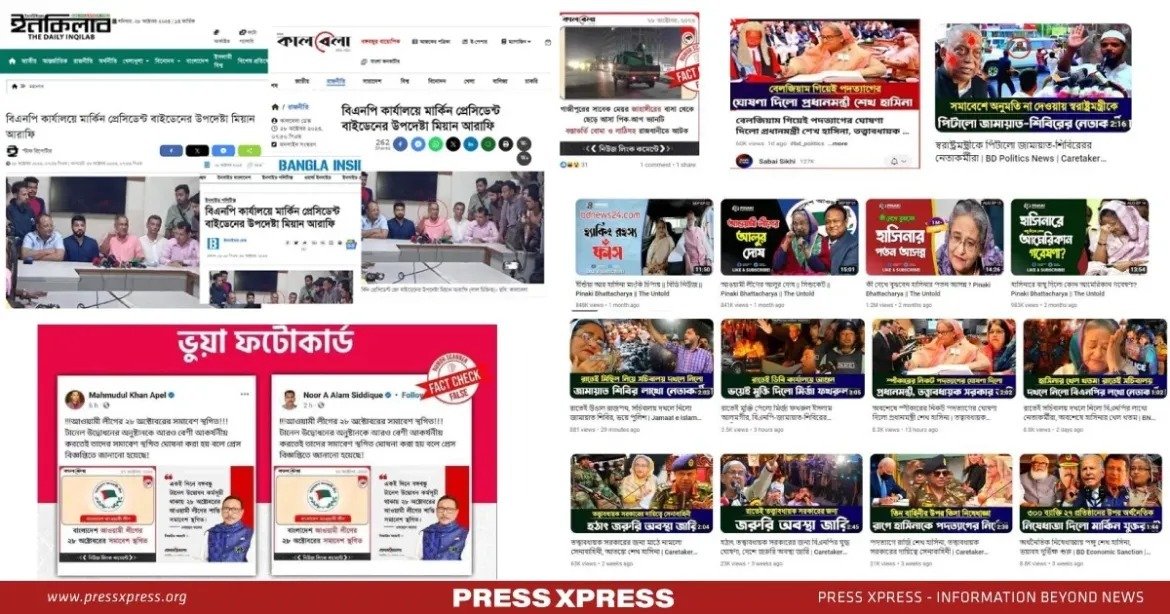Highlights:
- Thirst trapping being used to increase followers
- BNP investing huge money to propagate manipulated narratives
- Fake profiles, deceptive FB pages tools of propaganda
Ahead of the 12th national election due on January 7 next, the country’s opposition party the Bangladesh Nationalist Party (BNP) has resorted to a vicious campaign of spreading disinformation on cyberspace through various social media and private messaging platforms, needless to say, in an attempt to misguide public opinion.
It seems, failing to steer up its movement on the streets, a large number of BNP activists have turned to social media to fulfil their dream of ascending to power by hook or by crook.
You can also read: Question Over Joining Polls: Is Split Looming In BNP?
As the general election approaches, this covert campaign is unfolding in cyberspace alongside the escalating situation in the streets where BNP men have been creating mayhem during the last two weeks by burning public transports in the name of enforcing blockade to press their anti-constitutional demand of caretaker government.
Shaping public opinion thru systematic disinformation
BNP’s cyber cadres are intensifying their unethical virtual campaign, with an aim to shape public opinion through the systematic spread of disinformation and propaganda on social media and private messaging platforms.
Their tactics include the use of fake profiles, and creation of deceptive FB pages impersonating the ruling government. Moreover, strategy like ” thirst trapping”, a type of social media post intended to entice viewers sexually, is being used to build an audience before disseminating false information. It is worthy of mention that many of the BNP’s disinformation spreaders disguise themselves as “news sites” on Facebook, although those so-called news outlets do not have any identifiable authors or publishers.
A recent investigation by a prominent national daily – based on the analysis of numerous posts on Facebook pages, groups, and messaging apps run by mostly unidentified administrators – reveals that BNP is investing substantial sums of money to propagate their manipulated narratives.
This sudden surge in spreading disinformation is particularly alarming at a time when the public needs reliable information to make well-informed decisions regarding the upcoming election.
84 instances of political disinformation identified in September
In September alone, fact-checkers identified at least 84 instances of political disinformation, marking a significant increase from the 32 identified in January, according to Dismislab, a fact-checking organization.
The misinformation provided by BNP activists often revolves around topics such as US visa policies and sanctions. The impact of such manipulated content is perilous as it distorts the worldview of individuals, and hinders citizens from engaging in informed and constructive discussions on pressing issues.
Furthermore, the blurred lines between news organizations and propaganda outlets on social media platforms raise serious concerns about the erosion of public trust in credible sources of information. A growing number of people are now turning to unverified accounts seeking insights not found in traditional media which ultimately facilitates the dissemination of false information.
Proponents of the BNP disseminated numerous photos and videos across their social media platforms, predominantly on Facebook and YouTube, asserting that Prime Minister Sheikh Hasina had resigned, leading to the dissolution of the parliament. These propagandist posts gained rapid traction, reaching hundreds of thousands of online users.
PressXpress’s Enquery
Press Xpress identified a substantial volume of misleading assertions, alleging that the BNP had declared war, an emergency situation had been proclaimed in the country, the Army was deployed with the declaration of a caretaker government, and BNP-Jamaat supporters had seized control of the capital and the secretariat building. It is crucial to note that these claims are entirely false, yet they managed to attract the attention of thousands of individuals.
In another instance of propaganda, the fictitious organization ‘Activate Rights’ shared a post on the social media platform LinkedIn without citing any credible sources. Intriguingly, the information provided is entirely inaccurate.
It is evident that BNP and like-minded parties are taking advantage of people’s limited digital literacy to promote distorted narratives through various platforms. It is high time that the government take a firm stance against fake news spread by BNP-Jamaat activists and stop the party propaganda.

Safeguarding the integrity of the democratic process demands a collaborative effort from the government, tech platforms, and media organizations to promote media literacy, strengthen fact-checking capabilities, and foster an environment where accurate information prevails over intentional manipulation.


